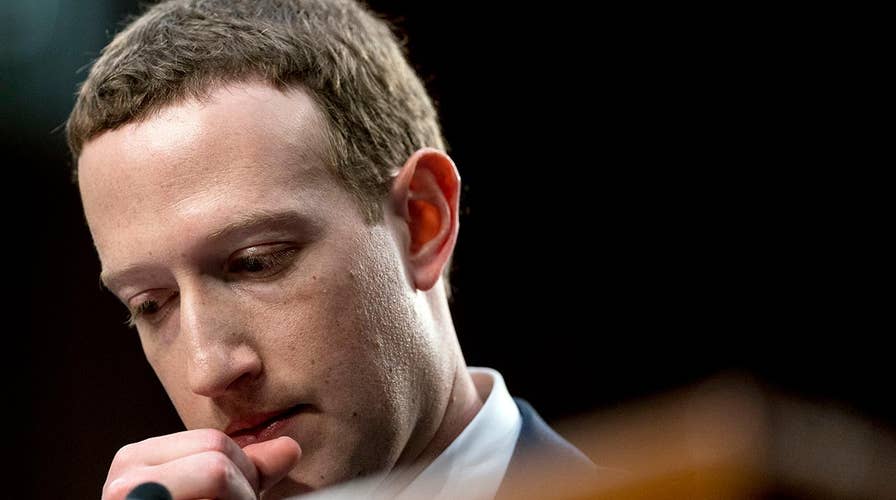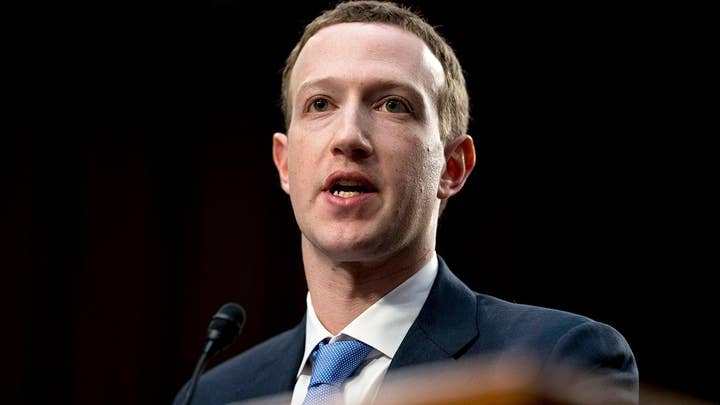Highlights: Zuckerberg grilled on the Hill
Facebook CEO Mark Zuckerberg spent hours taking questions from senators about Facebook's role in the 2016 election and American society more generally. Fox News Headlines 24/7's Brett Larson reports. #Tucker
Facebook founder and CEO Mark Zuckerberg testified before Congress Tuesday that he will make big changes to Facebook to prevent user data from being improperly used in the future — but his testimony also raised an ominous threat for conservatives seeking to exercise their free speech rights.
The threat was raised by Zuckerberg’s pledge to battle “fake news” and “hate speech” — terms that have long been used by the left to silence conservatives and supporters of free speech. That’s because “hate speech” to some on the left is another term for “conservative speech.”
“Facebook is an idealistic and optimistic company,” Zuckerberg told the Senate Judiciary and Commerce Committees. “For most of our existence, we focused on all the good that connecting people can bring. … But it’s clear now that we didn’t do enough to prevent these tools from being used for harm as well. That goes for fake news, foreign interference in elections, and hate speech, as well as developers and data privacy.”
Zuckerberg told the committees that his team will root out people who are using Facebook to “spread misinformation” and to ensure Facebook’s tools are “used for good” — including the March for Our Lives anti-gun movement.
“It’s not enough to just connect people, we have to make sure those connections are positive,” Zuckerberg said. “It’s not enough to just give people a voice, we have to make sure people aren’t using it to hurt people or spread misinformation.… Across the board, we have a responsibility to not just build tools, but to make sure those tools are used for good.”
Zuckerberg’s promise to end “hate speech” and his longstanding support for left-wing candidates doesn’t offer much comfort to those of us who support individual liberty and are regularly accused of being “racist,” “sexist” and “homophobic.”
Zuckerberg’s promise to silence “hate speech” and those who spread misinformation — as well as to avoid hurting people — sounds like a mission that all Americans, including conservatives, can get behind. After all, everyone agrees Facebook ought to have the right to prevent white supremacists, neo-Nazis, violent users and Islamic terrorists from using its platform to promote evil.
But what about Diamond and Silk — two pro-President Trump political commentators with millions of social media followers? They were recently informed by Facebook that their videos — which regularly appear on popular conservative media outlets, including the Fox News Channel — are “unsafe to the community.” That’s a patently absurd position Facebook now says its “reconsidering” after receiving immense media backlash.
Or consider Facebook’s treatment of Austin Peterson, a Republican Senate candidate in Missouri. He was banned from Facebook for 30 days in September for promoting his campaign’s AR-15 gun giveaway.
When questioned by Republican Sens. Ted Cruz of Texas and Ben Sasse of Nebraska about the possibility of Facebook silencing free speech, Zuckerberg initially assured the senators that his goal is to allow users to have open political discourse.
But when pressed by Sasse to explain the definition of “hate speech” — which Zuckerberg says his company bans and will do more to ban in the future — the Facebook CEO timidly responded: “I think this is a really hard question, and I think it’s one of the reasons why we struggle with it.”
Zuckerberg’s promise to end “hate speech” and his longstanding support for left-wing candidates doesn’t offer much comfort to those of us who support individual liberty and are regularly accused of being “racist,” “sexist” and “homophobic.”
Facebook, Twitter and other social media powerhouses are private companies, which means they don’t have to abide by the First Amendment the way a government entity must. These giants are becoming the gatekeepers of public discourse, and there’s little interest in Silicon Valley in protecting conservatives’ rights.
The Senate hearing where Zuckerberg testified was predominantly about how Facebook plans to protect user data and prevent foreign nations from using the platform to interfere in elections. On those questions, Zuckerberg outlined several important, reasonable steps the company is taking to protect its users. These include verifying the identities of all those who publish political ads on Facebook and making it easier for users to opt out of Facebook’s various data agreements.
However, a decade into the future, I doubt anyone will remember this week’s hearings as a milestone for social media users’ privacy rights.
But we may look back at this moment as the beginning of the end of conservative speech on major social media platforms, when one of the most influential people in the world announced his commitment to stop users from hurting people and making the community feel “unsafe.”
Whatever that means — and after hours of testimony, we still don’t know — it’s very likely to spell censorship for conservatives. The ultimate result may be a loss of the ability of conservatives to speak freely about their views in what has become an enormous global public square, where 2.2 billion Facebook users look for news and opinion and are entitled to a free flow of ideas.






















